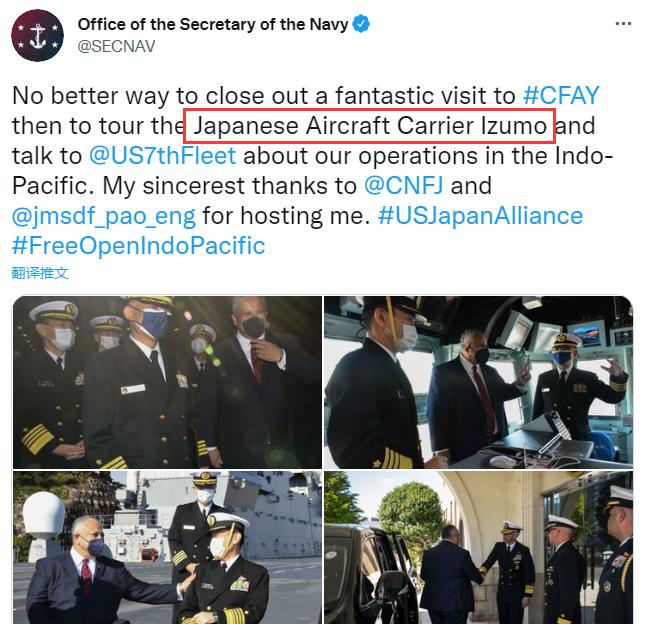Source: World Wide Web
The US media noted that after boarding the Japanese ship Izumo recently, the US Secretary of the Navy issued a tweet saying that he had boarded Japan's "aircraft carrier." The US media believes that although Japan is avoiding the use of "aircraft carriers", the United States has openly acknowledged the "historic transformation" of Japan's ownership of aircraft carriers. A U.S. Navy spokesman then said that the U.S. Secretary of the Navy's remarks did not mean that the official U.S. perception of the Izumo had changed.
The US "military" website reported on October 28 that US Secretary of the Navy Carlos del Toro posted a tweet after returning from his recent defense of Japan, claiming that he had boarded Japan's "Izumo" aircraft carrier.

U.S. Secretary of the Navy Toro used the phrase "Japan's Izumo aircraft carrier" in his tweet
Japan's current "peace constitution" means that since World War II, the carrier-based aircraft on the ships of the Japanese Maritime Self-Defense Force can only be used for self-defense, not fighters, and the Japanese side is also avoiding the use of the term "aircraft carrier".
Whether intentionally or unintentionally, Toro's statement led the United States to publicly acknowledge Japan's "historic shift." At the end of 2018, Japan announced plans to modify two helicopter carriers, including the Izumo aircraft carrier, which will be used to carry U.S.-made F-35B fighter jets.
But a U.S. Navy spokesman later said, "This tweet [of Toro's] does not imply a change in official U.S. perception of the ship." ”
Japan has a self-defense force, which most people consider military power, but Japan's constitution declares that it "will not maintain the army, navy, air force and other war forces", which means that Japan has always avoided any military action or military build-up that is considered offensive.
Jeffrey Hornon, a japan studies scholar at the RAND Corporation, an American think tank, explains: "Many governments believe that Japan has the right to maintain its military capabilities and use the 'minimum necessary level of self-defence.'" "Historically, any act that exceeds this standard has been considered a potential war and therefore unconstitutional." In the traditional sense, Hornon explains, there are four things that indisputably fall into this category: intercontinental ballistic missiles, medium-range ballistic missiles, long-range bombers, and aircraft carriers.
The USS Reagan aircraft carrier conducted a joint exercise with the Japanese aircraft carrier Izumo
The report mentioned that Japan's "Izumo" is a helicopter carrier with a full load displacement of 27,000 tons, which is larger than the Italian "Garibaldi" aircraft carrier. Although much smaller than the U.S. Navy's 90,000-ton Nimitz-class aircraft carriers, and even the Izumo, China's 58,000-ton Liaoning, it is the largest ship in japan's Maritime Self-Defense Force since World War II. Just on October 3, two F-35B stealth fighters from the U.S. Marine Corps successfully took off and landed on the flight deck of the Izumo, the first fighter jet from a Japanese aircraft carrier since World War II.
When talking about "Japan's plan to transform the helicopter frigate Izumo into an aircraft carrier," Chinese Foreign Ministry spokesperson Hua Chunying said: We urge the Japanese side to adhere to "exclusive defense," persist in taking the path of peaceful development, act cautiously in the field of military security, and do more things conducive to enhancing mutual trust between regional countries and regional peace and stability, rather than the opposite. In recent years, we have heard Japanese officials say many times that Japan is a force for peace. It is hoped that the Japanese side will truly implement the relevant statements into its policies and actions.